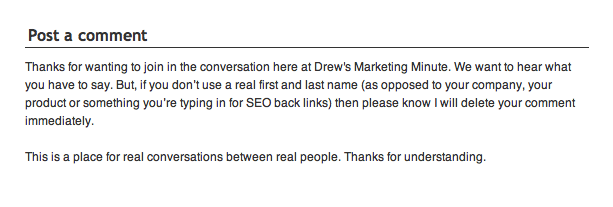|
|
We need to take a stand on the idea of anonymous comments. And the stand is — they need to go away.
I think this problem has its roots in the newspaper industry. When they starting creating digital versions — they wanted to take advantage of the interactivity of the web. And in the newspaper industry — it's all about the numbers (subscribers, pass along rate, etc) so it's no surprise that they wanted a huge volume of comments as well.
No doubt, someone told them that people will comment with more frequency if you don't ask for their name or contact information so voila — the anonymous or the "use a nickname, not a real name" comment was born.
Sadly, this has seeped into blogs as well. And as more companies wade into the social media waters — many marketing types, looking to justify the time and efforts spent on the tools — point to the comment count with pride.
But what really are we counting?
I don't care if you're talking about a traditional newspaper's website or a blog — when you allow anonymous commenting, you disrespect the topic, the conversation and the readers.
These are not conversations — they are verbal vomit.
It's perfectly logical that the anonymity invites people to behave in ways they wouldn't if they had to identify themselves. And it swings to both ends of the spectrum. On the one hand — they're vicious in their personal attacks, cruel comments and judgments. On the flip side, they can completely bypass the topic all together in an attempt to get some link love/attention for their product or service.
So what do we do about it? We say no.
We write to our newspapers and ask them to actually be responsible for creating real conversations on their sites. By demanding, just like they do in their traditional letters to the editor section, that commenters be identified (and verified) by name and city.
In terms of social media — if you own a blog, fight back. Here are some of the things I've done to combat the problem:
- Have a stated comment policy (see the visual above) that says you will delete anonymous comments
- Actually delete them — even if they are relevant (you can e-mail the person and ask them to re-submit, using their name)
- Close comments after 30 days (many of the back link seekers go into your archives to tuck key word rich comments where they think you'll ignore them)
- Actually respond to the comments — you'll get lots more of them if people think they're not talking into a black hole
Whether it's someone calling themselves "MoonDog127" and ripping into someone based on a story in a digital newspaper or it's "Korean Wedding Dress" leaving 27 random comments on your blog — we need to recognize the conversation deserves better.
What do you think? Is there ever a place for anonymous commenting?


![Reblog this post [with Zemanta]](http://img.zemanta.com/reblog_e.png?x-id=386f48e7-d64a-4810-a4e5-5cfbbcac9339)